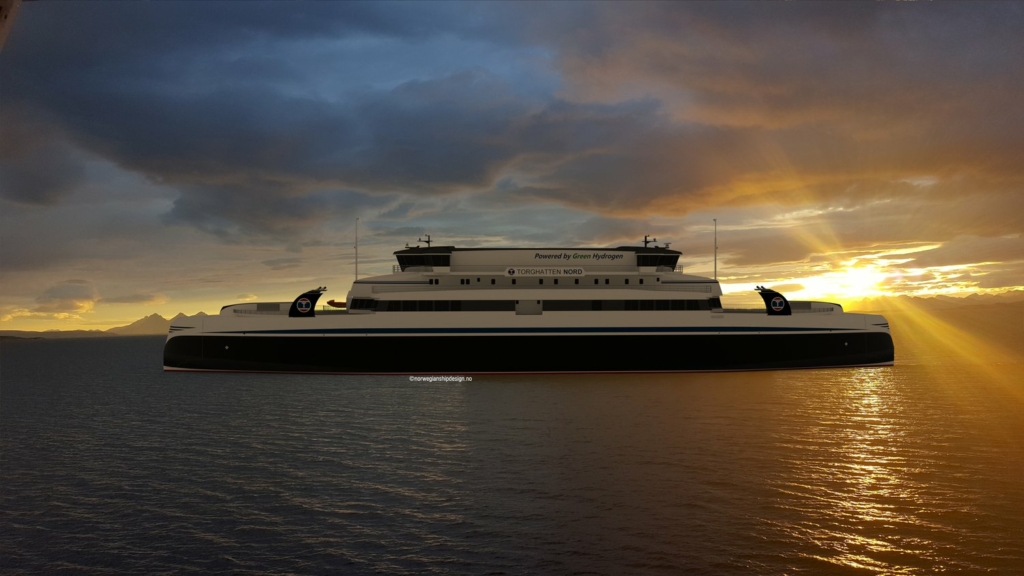
| At Sea., Press Releases
Bergen Engines, a leading producer of medium-speed engines and generating sets, has been selected to provide four C25:33L8A generating sets to support the world’s largest hydrogen ferries, operating on Norway’s longest ferry connection from Bodø to Lofoten.
The generating sets will be fueled by low carbon Hydrotreated Vegetable Oil (HVO) and will serve as reliable support power to the hydrogen fuel cells onboard, which act as the vessel’s main propulsion power. These new ferries will be powered with a hybrid mix of 85% hydrogen fuel cells and 15% biofuel from Bergen’s C25:33 engines.
HVO is a renewable fuel made from biomass sources – such as vegetable oils, animal fats, and waste oils – through a process called hydrotreating. This process removes impurities and alters the molecular structure of the feedstock to produce a high-quality fuel that is chemically similar to petroleum-based diesel.
It is seen as an important fuel for the future in the marine industry for several reasons:
- Renewable
- HVO is made from renewable feedstocks, which means it has the potential to reduce dependency on fossil fuel and lower greenhouse gas emissions.
- Compatibility
- HVO can be used as a drop-in fuel, meaning it can be used in existing diesel infrastructure, making it an attractive option for the marine industry where retrofitting can be costly and/or time-consuming.
- Cleaner Emissions
- HVO typically produces lower emissions of pollutants such as particulate matter, nitrogen oxides (NOx), and sulfur oxides (SOx) compared to conventional diesel. This is particularly important for the Marine industry, where there is increasing pressure to reduce its environmental impact.
The hydrogen ferries, commissioned by Torghatten Nord, have been designed by Norwegian Ship Design Company and will be constructed by Myklebust Verft. Leveraging locally produced hydrogen and a diverse range of Norwegian suppliers, these vessels will revolutionize maritime transportation and showcase the depth of knowledge and innovation within Norway’s maritime industry.
Eirik Olsen, Operations Director at Torghatten Nord, remarked, “Norway has the will, expertise, and experience needed to realize our zero-emission ambitions, and develop world-leading solutions for maritime operations. Our Norwegian partners are at the forefront of design and development in energy-efficient ships and technology, and this project will greatly contribute to competence development in maritime, electrical, automation, and engineering fields.”
Through this project, Torghatten Nord will become the first major purchaser of hydrogen in Norway, contributing significantly to the further advancement of the Norwegian hydrogen industry. Beyond environmental benefits, this initiative is spearheading the development of a vibrant green economy by fostering job creation and innovation.
Marius Hansen, CEO of Torghatten Nord, expressed his pride in the project’s accomplishment, stating, “There are no other maritime hydrogen projects internationally that come close to the scale and ambitions of this project. Therefore, we’ve prioritized building a team of Norwegian suppliers with the goal of transporting locals, businesses, and tourists in a safe, efficient, and comfortable way.”
Scheduled for delivery in 2026, the hydrogen ferries represent a historic milestone in the maritime industry’s transition to cleaner energy sources. With these vessels in operation, CO2 emissions in the Vestfjord connection are expected to be reduced by 26,500 tonnes per year, equivalent to removing 13,000 diesel cars from the road. With the support of Bergen Engines and other Norwegian suppliers, Torghatten Nord is leading the charge toward a greener, more sustainable future.


